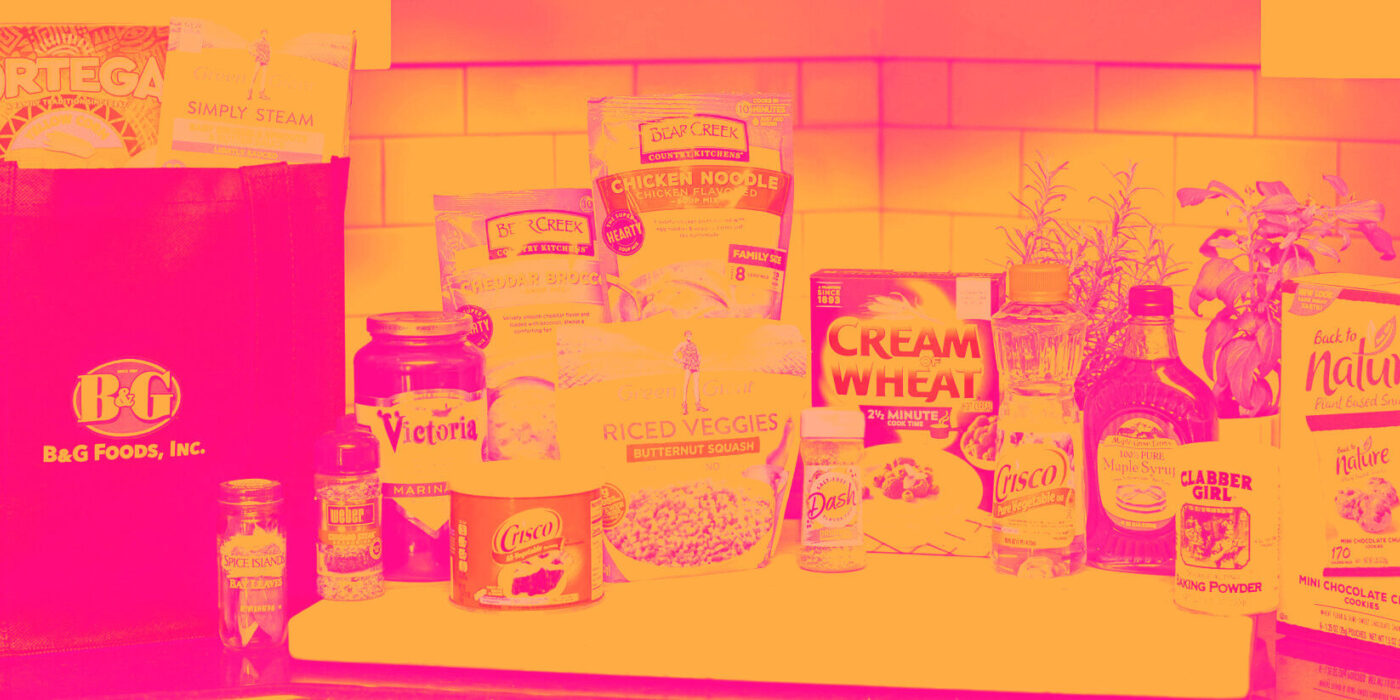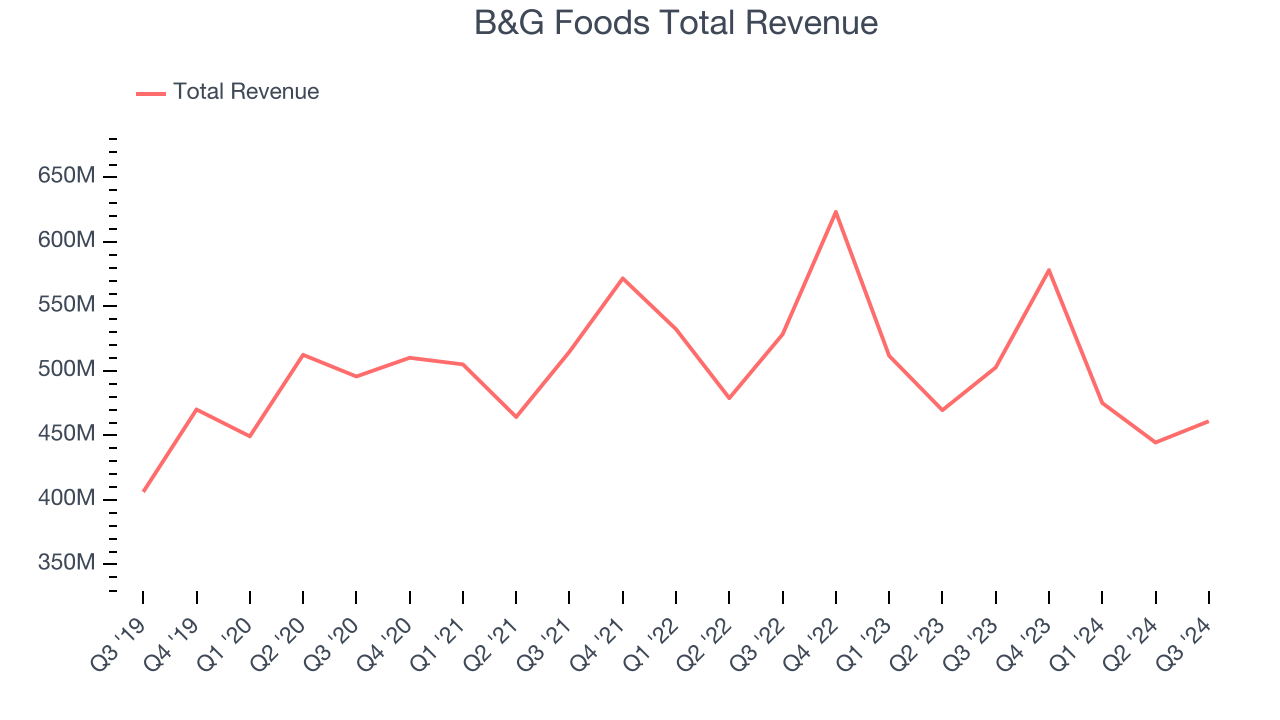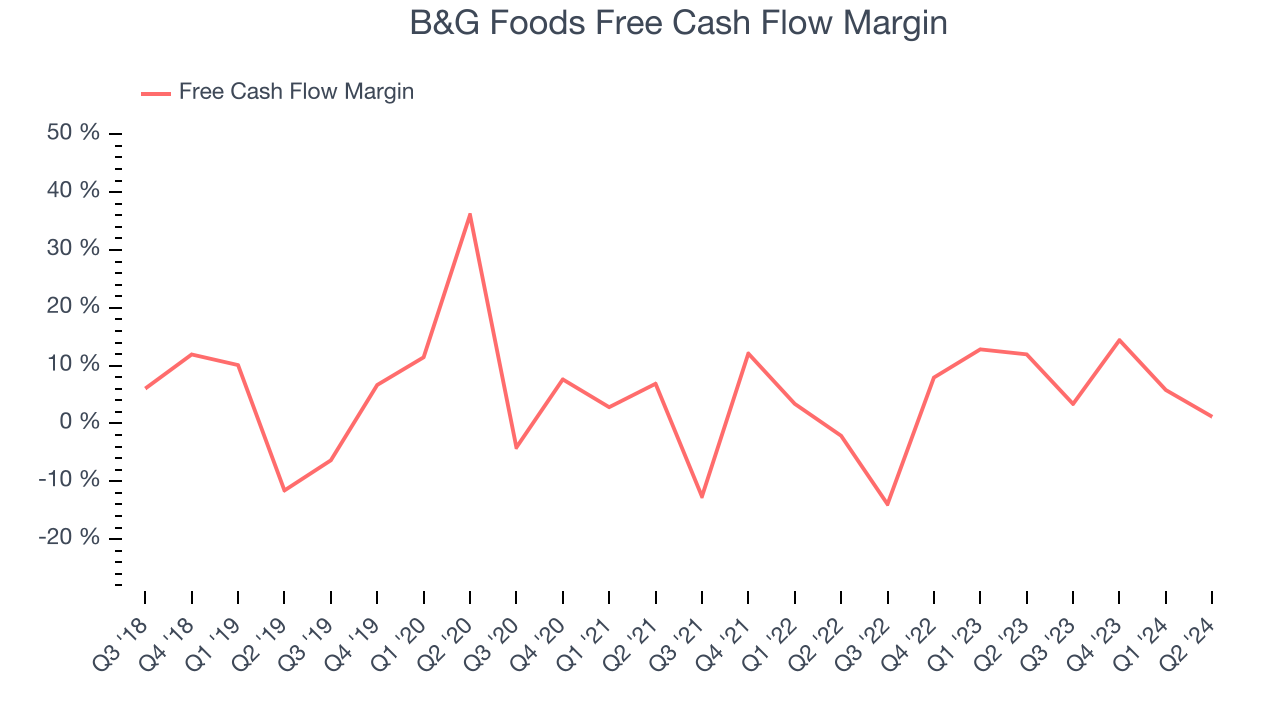
Packaged foods company B&G Foods (NYSE:BGS) missed Wall Street’s revenue expectations in Q3 CY2024, with sales falling 8.3% year on year to $461.1 million. The company’s full-year revenue guidance of $1.94 billion at the midpoint came in slightly below analysts’ estimates. Its non-GAAP profit of $0.13 per share was also 34.5% below analysts’ consensus estimates.
Is now the time to buy B&G Foods? Find out by accessing our full research report, it’s free.
B&G Foods (BGS) Q3 CY2024 Highlights:
- Revenue: $461.1 million vs analyst estimates of $471.4 million (2.2% miss)
- Adjusted EPS: $0.13 vs analyst expectations of $0.20 (34.5% miss)
- EBITDA: $70.37 million vs analyst estimates of $76.6 million (8.1% miss)
- The company dropped its revenue guidance for the full year to $1.94 billion at the midpoint from $1.96 billion, a 1.1% decrease
- Management lowered its full-year Adjusted EPS guidance to $0.72 at the midpoint, a 10% decrease
- EBITDA guidance for the full year is $300 million at the midpoint, in line with analyst expectations
- Gross Margin (GAAP): 22.2%, in line with the same quarter last year
- Operating Margin: 11.1%, up from -14.4% in the same quarter last year
- EBITDA Margin: 15.3%, in line with the same quarter last year
- Sales Volumes were up 4.7% year on year
- Market Capitalization: $685.6 million
Commenting on the results, Casey Keller, President and Chief Executive Officer of B&G Foods, stated, “B&G Foods’ third quarter results reflected a slower than expected recovery in sales trends, consistent with the center store packaged food industry. We expect trends to gradually improve and stabilize into the first half of 2025 as we lap consumer reaction to higher prices across food categories.”
Company Overview
Started as a small grocery store in New York City, B&G Foods (NYSE:BGS) is an American packaged foods company with a diverse portfolio of more than 50 brands.
Shelf-Stable Food
As America industrialized and moved away from an agricultural economy, people faced more demands on their time. Packaged foods emerged as a solution offering convenience to the evolving American family, whether it be canned goods or snacks. Today, Americans seek brands that are high in quality, reliable, and reasonably priced. Furthermore, there's a growing emphasis on health-conscious and sustainable food options. Packaged food stocks are considered resilient investments. People always need to eat, so these companies can enjoy consistent demand as long as they stay on top of changing consumer preferences. The industry spans from multinational corporations to smaller specialized firms and is subject to food safety and labeling regulations.
Sales Growth
A company’s long-term performance is an indicator of its overall business quality. While any business can experience short-term success, top-performing ones enjoy sustained growth for multiple years.
B&G Foods is a small consumer staples company, which sometimes brings disadvantages compared to larger competitors benefitting from economies of scale.
As you can see below, B&G Foods’s demand was weak over the last three years. Its sales were flat, but to its credit, consumers bought more of its products. We’ll explore what this means in the "Volume Growth" section.

This quarter, B&G Foods missed Wall Street’s estimates and reported a rather uninspiring 8.3% year-on-year revenue decline, generating $461.1 million of revenue.
Looking ahead, sell-side analysts expect revenue to remain flat over the next 12 months. This projection is underwhelming and shows the market believes its newer products will not accelerate its top-line performance yet.
Today’s young investors won’t have read the timeless lessons in Gorilla Game: Picking Winners In High Technology because it was written more than 20 years ago when Microsoft and Apple were first establishing their supremacy. But if we apply the same principles, then enterprise software stocks leveraging their own generative AI capabilities may well be the Gorillas of the future. So, in that spirit, we are excited to present our Special Free Report on a profitable, fast-growing enterprise software stock that is already riding the automation wave and looking to catch the generative AI next.
Cash Is King
Free cash flow isn't a prominently featured metric in company financials and earnings releases, but we think it's telling because it accounts for all operating and capital expenses, making it tough to manipulate. Cash is king.
B&G Foods has shown impressive cash profitability, giving it the option to reinvest or return capital to investors. The company’s free cash flow margin averaged 8.4% over the last two years, better than the broader consumer staples sector. The divergence from its underwhelming operating margin stems from the add-back of non-cash charges like depreciation and stock-based compensation. GAAP operating profit expenses these line items, but free cash flow does not.

Key Takeaways from B&G Foods’s Q3 Results
We struggled to find many strong positives in these results as its sales and earnings missed Wall Street’s estimates. On top of that, it lowered its full-year revenue and EPS guidance. Overall, this was a weaker quarter. The stock traded down 13.9% to $7.60 immediately after reporting.
B&G Foods’s earnings report left more to be desired. Let’s look forward to see if this quarter has created an opportunity to buy the stock. If you’re making that decision, you should consider the bigger picture of valuation, business qualities, as well as the latest earnings. We cover that in our actionable full research report which you can read here, it’s free.